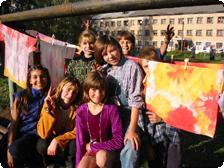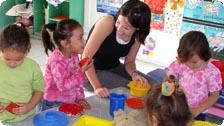by Emily McCormick
I don’t like to travel without my husband. Not that we’re glued at the hip, but we like to share travel experiences together. So it was a big deal when I was invited to visit Russian orphanages along with some board members of KidsDom (a Christian charity) and a pastor from my church. As a professional social worker, the opportunity to bring joy and help to orphaned children was in my DNA. My husband and I agreed that this time I’d go solo.
I left in September, 2003 for two weeks in Russia, laden down with suitcases stuffed with toys, underwear, socks and other supplies for the kids. That first night in Moscow was surreal. I had pictured Moscow to be dominated by ugly, communist-style apartment blocks and to have an oppressive feel. But graceful buildings, fountains, flowers, and upscale boutiques, combined with the beautiful Moskva River, gave the sense of a cosmopolitan city continuing to undergo great changes. We trekked around the Kremlin after dinner, walking through Red Square and standing in awe before St. Basil’s Cathedral. The mall near our hotel was packed with young, hip Russians buying the latest fashions.
Moscow, however, is not typical of Russia. Driving from Moscow south to Rayzan, we entered a different world. While many Russians have found prosperity and freedom with the fall of communism, others have plunged into poverty. Orphanages are Russia’s attempt to care for the hundreds of thousands of children displaced by alcoholism, neglect, abuse, and poverty since the fall of communism. I felt very far from home as we bounced along the two-lane highway in the van with techno music blaring. Every once in a while, we would pass a roadblock with police pulling over cars; our driver looked nervous. I wondered how we would communicate with the children, even with the help of our translators.
We drove up to the Rybnoe Orphanage, a bleak, two-story complex that looked like a scene from Oliver Twist. Within minutes, children came pouring out the front doors, eager to welcome us and interact with the Americans. The children swarmed us, hanging on our hands, wanting to be hugged, trying to help us with the luggage. Tears formed in my eyes.
The language barrier was not a problem! Gestures and mime go a long way. I was shown the classrooms, a computer lab, the apple orchard, the dining hall where all 170 children eat in shifts, and the dormitory-style bedrooms where up to ten children sleep in “family groups.” All the children seemed busy: doing chores in their living quarters, picking apples or mushrooms, practicing crafts. What touched me was the children’s desire to share their meager possessions—handmade bracelets, small plastic toys, cardboard pictures from a puzzle box, and photos of themselves.
Rybnoe is one of the more advanced orphanages, thanks to the work of KidsDom over the years. The computer lab was set up with help from Cisco and Hewlett Packard, and others have provided containers of clothing and shoes, and medical assistance. American volunteers run camps twice a year, enabling the kids to develop relationships with caring adults and just have fun for a week.
The Skopin Orphanage, two hours further south in a small village, was like going from okay to worse. The shower pipes in the basement were so rusted and broken down that the kids walked into the village, even in the middle of winter, to take showers. They showered once a week and were given clean clothes to wear until the next week. The food, although adequate, consisted mainly of meat and starch. The kids appeared younger than their actual age due to malnourishment. Unlike Rybnoe, the children were not grouped in “families” with a caregiver. Rather, dormitory-style bedrooms overflowed with as many as twenty children to a room. There was little apparent structure or supervision, with boys and girls freely visiting each other’s bedrooms.
The children were amazingly open about their lives. I went to bed each night on my little wooden bed with the thin mattress and lay awake thinking about their stories. Sveta, age twelve, had found her father dead on the kitchen floor after he had a heart attack. Her mother subsequently remarried a physically abusive man, contributing to her mother’s death a year later. When her brother could not care for her, Sveta was sent to live at the orphanage. I have never met a sadder little girl. But as she told us her story over successive days, Sveta became a different child. Her beautiful smile emerged. I think for the first time since losing her mother she felt like someone cared about her.
One little boy, Pasha, had been at the orphanage for one week. His teacher told me that he was coping with this by obsessively drawing or working on puzzles. His little head was always bent over some activity, as if to block out the reality of his environment. By the end of our visit, he was sitting on our laps and looking us in the eyes.
Lena, age nine, pulled me aside one night and told me through the translator that she wanted to tell me about herself. She lifted her nightshirt to show me her back, which was a mass of scars. When she was three years old she was badly burned, by purpose or accident it was hard to determine. This brave little girl faces yet another skin graft surgery. She still writes me notes and sends me cheerful drawings of horses and flowers.
Children in Russian orphanages often receive the message: you are an orphan; you are worth nothing and have no hope to accomplish anything in life. In one of my conversations with the older girls about pursuing dreams, they told me, “Not for girls. Not in Russia.”
Kids described life in the orphanage as “bleak” and “boring,” so whatever we did to connect with them—sports, crafts, tie-dyeing t-shirts, reading bedtime stories—seemed to lighten their days. It was wonderful to see the kids smiling and having fun. More significantly, our visit communicated to them that people as far away as California care about them. We told the kids that they are special—to us, and to God, and that there is hope and purpose in life.
The trip changed my life. I absolutely loved the experience of travel combined with helping others. I realized that while I can’t save the world, I can do my little bit to make a difference. I have since accepted the invitation to join the board of KidsDom and returned to Russia in January (yes, winter in Russia is intense!). I think about the kids constantly. Their photos are all over my bulletin board, and I talk about them at every opportunity. Several of the children write to me. They tell me about their experiences and life at the orphanage, and send little notes and pictures on scraps of paper.
For anyone thinking about a trip like this—go for it! You’ll be surprised what happens in your heart and life.
KidsDom is a Christian charity established to help Russian orphans and has been working in Russia for over ten years.
To learn more about KidsDom, visit our website at www.kidsdom-russia.org
* * * *
Emily McCormick, LCSW is a child and family therapist in private practice in the Bay Area in California. Emily specializes in working with children who have been affected by abuse, divorce, death, and trauma. She also has experience in working with adoptive families. She’s married to a great guy (Taylor) who is very supportive of her work, wherever it takes her.







